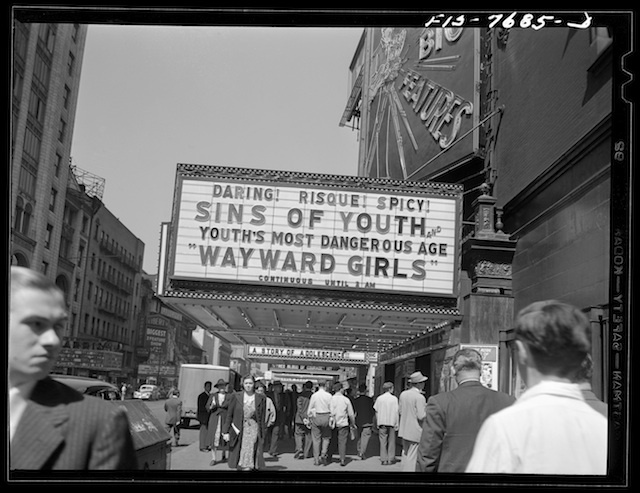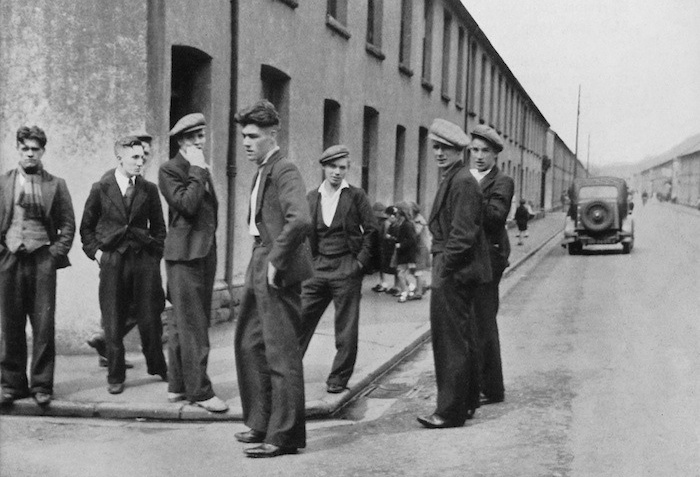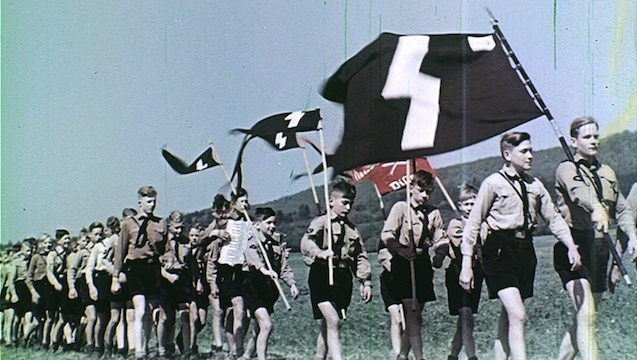
Advertisement
Jon Savage: They weren't pre-war, but the ones who didn't make it in are the Zazou. They were a French group in occupied Paris in the early 1940s who loved black American swing music—which was forbidden—wore English clothes, threw hidden parties, tried to avoid forced labor and, you know, annoyed the Gestapo. They also did something else fabulous: When the laws came in about wearing the yellow star, they made their own stars that, instead of "Jew," said "Swing." Then there were others that we didn't get into too much detail about—the back-to-nature movements of the 20s, like the Wandervogel.Oh yeah, the German proto-hippies who got naked and hung out in forests. Did that movement start during the First World War?
Jon:No, they actually began in about 1900 in Germany.So it wasn’t a reaction to the war?
Jon: Well, it was a reaction to the militarization and industrialization of German society. There was also a generation gap between adolescents and their parents, and by the 20s there were lots of different groups. In fact, it's bewildering the amount of groups there were by then, ranging from proto-fascist groups to hippies.
Advertisement
Jon: If you consider a youth movement as something where youth try to find some degree of autonomy and try to define for themselves what being a young person could be, then I’d say yes.

Matt Wolf: I think the "teenager" was really born as a sort of democratic consumer during the war in the 40s. It was when young people were starting to work and earn money. They weren't dependent. And also they had a new power to define themselves by buying music, fashion, cosmetics… They recognized their value as democratic citizens who could be positive contributors to society, but also their influence and power as consumers who could buy things and drive marketplaces.It's funny how, early on, youth was defined by the establishment and the marketplace. Adolescence is supposedly about freedom and rebellion, but even the word "teenage" didn't become part of the wider lexicon until the New York Times wrote a huge feature codifying it and establishing what it was—as you show in the film.
Jon: Yeah, it was that balance of adults accepting that teenagers are going to have a say while also keeping some sort of control over them.
Matt: Definitely. I think that's a productive and useful compromise, because if young people had no supervision they would probably be out of control. But the film also shows that when young people are regimented in the way that Hitler and the Nazi regime did, it’s extremely destructive.
Advertisement
Jon: Absolutely. The swing and black American bands were still quite a minority phenomenon before the war; it didn't immediately take over the UK—it was more avant-garde. Then the Americans came over and British adolescents suddenly got to see this other life.Swing itself is completely fascinating, because it’s the first Western international youth culture and it's just got everything. It's amazing how it was used, as I was saying, by the Zazou—and the Hamburg Swing, who were like German Zazous—during WWII as a method of resistance. It wasn't political; all they wanted to do was what kids do now: listen to music, hang out with their friends, have sex, and be a bit naughty. And for doing that in Nazi-occupied Europe they were sent to forced labor [camps], beaten up, sent to the Eastern Front, sent to concentration camps… It’s a very stark divide.

Jon: That’s not my experience of being a young person entering youth culture, but I think what you’re describing has accelerated in the past ten years. I think it’s to do with the privatization of the self, caused by social media and electronic devices, the fragmentation of consciousness and the fragmentation of the youth cohort in general. What’s fascinating to me is—I’m 60, so when I was a kid it was hippies, then glam rock, then punk rock—and punk rock talked about all this acceleration of information and privatization of the self. So now we’re living in the science-fiction future that was prophesied when I was a young man.
Advertisement
There are several reasons for that. I was your age in 1977 when I got involved in the music industry, and it was for kids—it was a playpen—not adults. Then, in the 80s, the music industry stopped targeting adolescents—the 15-to-24 range—and began targeting older people as well, meaning all that consumer nonsense was no longer just the preserve of teenagers. So young people lost their special status, which I think is part of the problem.Also, beginning in the 80s, there began a political attack on adolescents, starting with the Thatcher government and certainly continuing into this government with the social downgrading of young people, youth unemployment, university fees… and all this makes my blood boil. If a country doesn't invest in its youth, then it's going down the pan. That's the message of Teenage—adolescents are fucking great, listen to what they have to say. So what's going on makes me absolutely furious. Some kids are angry at people of my generation, but it’s not my fucking fault! I didn’t vote for Thatcher and I didn’t vote for this government either!

Matt: But I think it's really hard to identify with those [art- and music-based] movements as they're happening in real time. There are distinguishable and definable youth movements from the 90s, but that's because we can see them in retrospect. I can’t reflect as well on the present, because it’s happening right now, you know? I think there’s a youth culture online for sure, but I think it will present itself in a very different format from some of these things we tend to romanticize, like underground culture and punk.
Jon: I have a lot of theories about this. I was very passionate about Nirvana, and I just wonder if Kurt killing himself didn’t sort of kill the idea of rock music being challenging and subversive and dangerous. After that, you had Britpop, which had some great records, but it was kind of reheated 60s, really. You've had really good acts since then, like the Arctic Monkeys, but it doesn’t mean very much in a wider context. There are fantastic bands and they write great songs, but it’s like they’re in a kind of vacuum.
Advertisement
Every generation faces its own task. Your task is very different to mine. Your generation’s task is dealing with unsustainability: climate change, shrinking resources, how to make the transition from high progressive capitalism into something else—another way of living on this planet where you don’t have to throw out the good things that we have in our society. My generation’s challenge was to deal with WWII damage, really, which scarred all our parents and literally scarred the landscape when I was growing up.

Jon: What you also have now—and you've had for at least 25 years—is aggressive marketing and targeting. Punk rock really did develop underground for a while; people from advertising companies didn’t take it seriously for about 18 months, until the middle of '77.
Matt: I think it's more like the distinction between what's considered mainstream or underground is much blurrier, and that’s empowering for artists and young people who live in remote areas without access to urban resources. It confronts, yeah, but it also completely obliterates some of these distinctions that have evolved between mass consumer culture and independent culture.Good point. Finally, I've seen the film described as a "living collage." What does that mean?
Matt: Something Jon told me early on in the process is that punks in England took clothes from previous youth cultures, reassembled them with safety pins, and made something new. That image was really evocative to me and, in a sense, it's what I did with the film. I took clips, images, and quotes from teenagers from all these different eras and countries and tried to find a way to collage that together to create this new work. Because while Teenage is about the past, really my aim is to reflect on the present—to understand how conflicts between generations endure—and to show that we should have a very optimistic attitude towards youth today.
Jon: It’s time we start giving adolescents a bit more respect. Not in terms of being consumers, but in terms of being human beings who will be living in the future, and so might have some ideas about how they want the world to be, you know? Which we’re not getting from this benighted government, who seem perfectly happy to write off anybody under 25, as well as anybody who’s poor. It’s completely disgusting. Don’t get me started.Follow Jamie on Twitter: @jamie_clifton
